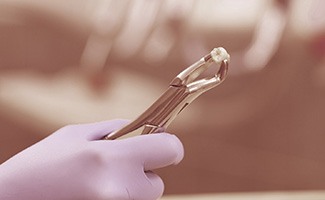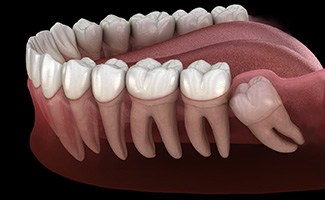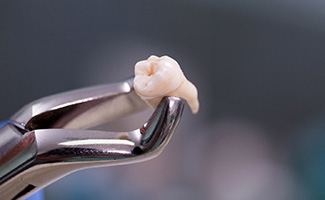Wisdom Tooth Extraction – Ocala
Wave Your Third Molars Goodbye!

In prehistoric times, our ancestors depended on their wisdom teeth. However, people today don’t require them to maintain a fully functional smile. They can actually cause more harm than good. That’s why it’s often recommended that patients get their wisdom teeth removed before they cause significant damage to the surrounding areas. At Weldon Implant & Cosmetic Dentistry of Ocala, we can extract your wisdom teeth if deemed necessary. To learn more about how this works or to schedule a consultation, give us a call!
Why Choose Weldon Implant & Cosmetic Dentistry of Ocala for Wisdom Tooth Extraction?
- Top-Rated Dental Team in Ocala
- Flexible Financing Available
- We Welcome Dental Insurance
What Are Wisdom Teeth?

The wisdom teeth are the third molars and the last adult teeth to erupt in the mouth. Most people develop 4 wisdom teeth – two on top and two on the bottom. Anthropologists believe that wisdom teeth were once helpful for our prehistoric ancestors who needed additional chewing power to consume rough plants, seeds, nuts, and foliage that made up their diets. It also wasn’t uncommon for teeth to fall out for one reason or another, so the wisdom teeth could step in and act as replacement teeth in those situations.
In modern times, we have a softer diet filled with carbohydrates and high-calorie foods, as well as a deep focus on dental care, so wisdom teeth aren’t usually needed. Some people don’t develop wisdom teeth at all, while others may have one, two, or three. The need for them to be extracted varies on a case-by-case basis.
Why Do Wisdom Teeth Need to Be Removed?

In many cases, wisdom teeth need to be extracted because they pose serious oral health threats. Numerous issues can occur if wisdom teeth don’t have enough room to develop properly. They include overcrowding, oral hygiene issues, discomfort, impaction, increased risk of cysts, and possible damage to the surrounding teeth. Here are some signs that could indicate that you need your wisdom teeth extracted:
- Pain while eating
- Jaw stiffness
- Facial swelling
- Bad breath
- Difficulty opening the mouth
- Repetitive infections
What to Expect from the Wisdom Teeth Procedure

If your wisdom teeth have already erupted from the gave, we will use dental forceps and an elevator to extract them. If they have not erupted, an incision needs to be made into the gums to expose the tooth and bone. Any bone that blocks access to the tooth will need to be removed. In some cases, a tooth may need to be removed in pieces. Afterward, the site of the extraction will be cleared of any debris and stitches may be used to close the wound if needed. Gauze is placed over the extraction site to control bleeding and help blood clots from forming and begin the natural healing process.
Recovering from Wisdom Teeth Extraction

After your procedure, it is common to experience bleeding, swelling, bruising, and discomfort, but this should subside over the next few days. During this time, it is especially crucial to maintain an excellent oral hygiene routine. This includes rinsing and brushing gently while avoiding the extraction site. You should also stick to a soft-food diet and refrain from smoking or using straws. Remember to take all proscribed and over-the-counter medications as directed. If you have any questions or concerns, give us a call so we can help.
Understanding the Cost of Wisdom Tooth Extractions

The cost of extracting wisdom teeth varies considerably from case to case, and we will only be able to give you a proper price estimate after Dr. Weldon has examined your mouth in our Ocala office. While having your wisdom teeth removed may seem costly at first glance, it’s important to remember that the procedure can eliminate constant discomfort and preserve your oral health for decades. Our team will be happy to assist you with navigating your payment options, so please feel free to contact our office with any questions.
Factors That Can Impact the Cost of Wisdom Tooth Extractions

The prices of wisdom tooth extractions vary based on a number of factors, and we’ll explain them in detail during your initial consultation. These include:
The number of wisdom teeth to be removed: Some people have only one, two, or three wisdom teeth. The more teeth that need removal, the more the cost will be.
Whether the teeth are impacted: Impacted wisdom teeth fail to emerge completely from the gums, creating shelter for harmful germs and leading to oral infections. Soft tissue impactions involve the tooth only being covered by the gums, making them easier to remove. Bony impaction, on the other hand, means that the tooth is lodged within the jawbone, making removing them harder and more expensive.
Anesthesia: The form of anesthetic treatment required for your surgery contributes to the cost.
Needing a dental specialist: If your case is more complex, we may have to refer you to an oral surgeon who uses a different pricing scale.
Does Dental Insurance Cover Wisdom Tooth Extractions?

While not all dental insurance plans cover dental surgeries, most will pay for at least part of the cost associated with wisdom tooth extractions, and this can largely hinge on whether you’ve met your annual maximum or deductible. Speaking with your insurance company directly is the best way to determine what your plan will cover, and selecting an in-network provider can help keep out-of-pocket costs to a minimum.
How to Make Wisdom Tooth Extractions Affordable

We accept insurance from a wide range of providers and are glad to help our patients file their claims. For patients without insurance, we also offer financing plans that can break a dental bill into small and easily manageable monthly payments through CareCredit, a trusted third-party financier. We’ll be happy to help you understand your choices and find the best payment method for your situation, so feel free to reach out to our staff if you need any assistance.
Wisdom Tooth Extraction FAQs
How long does it take to heal after wisdom tooth removal?
It usually takes about a week or so before a patient’s mouth starts to feel normal, and the surgery sites tend to fully close about three to four weeks after the procedure.
The best way to ensure this process goes as fast (and smoothly) as possible is to follow our team’s instructions, especially during the first 24-72 hours. This will allow your body to form a clot around the treatment area, which will keep it protected as well as help you avoid dry socket, a painful complication that also draws out the recovery process.
Do ALL wisdom teeth have to be extracted?
While the overwhelming majority of people need to have their wisdom teeth extracted, some rare patients do get to keep them. If the wisdom teeth aren’t causing pain or any other issues in the mouth, then we leave well enough alone. Of course, this doesn’t happen very often, and we always evaluate a patient’s wisdom teeth prior to removal to make sure the treatment will actually help them—we don’t just do it arbitrarily!
What can I eat after wisdom tooth removal?
Starting on the day of the procedure and the first couple afterward, we recommend that a patient stick to a soft food diet, consisting of easily consumed items like scrambled eggs, yogurt, soup, oatmeal, and plenty of liquids.
As time goes on, a patient can start introducing items that require more chewing (think pancakes or bread) and gradually resume their normal diet. Especially during the first week, it’s advisable to AVOID spicy, chewy, or sticky foods (nuts, chips, crackers) that could irritate the sensitive treatment area.
When is the best time to have wisdom teeth removed?
The ideal time to have the wisdom teeth removed is during the teen years. This is for a multitude of reasons, one being that the younger someone is, the faster their body will heal. Plus, teens tend to have fewer commitments compared to adults, so needing to adjust their schedule to recover is less consequential.
The best approach is to maintain regular dental checkups, and with those, we can keep an eye on a patient’s wisdom teeth so we can recommend their removal before they lead to big problems, preventing or even avoiding the pain and infection that might be coming down the road.

